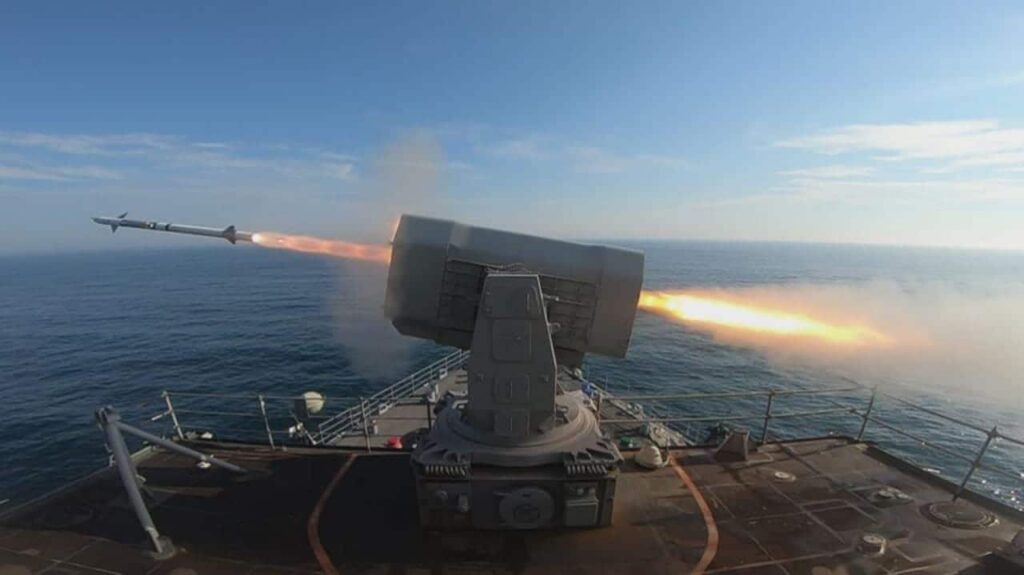The German government for the first time in years has given a green light for the large-scale export of arms worth several hundred million euros to NATO ally Turkey, according to a report on the Der Spiegel news website.
The decision for the start of arms exports to Turkey was made by the Federal Security Council, chaired by Chancellor Olaf Scholz.
The arms to be exported to Turkey include 100 anti-aircraft missiles and torpedoes for the Turkish naval forces and parts for the modernization of Turkish submarines and frigates.
According to a list of items to be exported to Turkey seen by Der Spiegel, weapons manufacturer MBDA has been allowed to supply Turkey with 100 guided missiles for the air defense of ships. The list does not specify the financial scope of the deal, but the price of the Rolling Airframe Missiles (RAM) is likely to be around 100 million euros. The Federal Security Council also approved the delivery of 28 SeaHake torpedoes from German engineering company Thyssenkrupp’s Marine Systems for 156 million euros.
In addition the list also includes two other arms deals. Various consortia of German arms companies have been allowed to supply material packages for the modernization of Turkish U209 submarines; the budget is 79 million euros. The delivery of engine parts for Turkish corvettes and frigates was also approved for 1.9 million euros. In total, the amount of arms exports to Turkey is likely to be around 336 million euros.
The figures illustrate a remarkable change in the attitude of the German coalition government, comprising the Social Democratic Party of Germany (SPD), the Free Democratic Party (FDP) and Alliance 90/The Greens, towards Turkey.
In recent years Berlin had drastically reduced all arms exports to Turkey amid tensions in the relations caused by President Recep Tayyip Erdoğan’s policies against critics in the country and military operations targeting Kurdish groups in Syria and Iraq.
As a result, only 17 mini-projects including arms exports to Turkey that had a value of 1.22 million euros were approved in 2023. The trend initially continued in 2024. According to official data, the German government only approved exports worth 23 million euros in the first quarter of this year.
The office of German Vice Chancellor Robert Habeck said earlier that the green light for the arms exports to Turkey would only be given if the arms requested concern joint projects with EU or NATO partners.
Germany’s decision to restart large-scale arms exports to Turkey comes on the heels of recent reports in the German media, also confirmed by Interior Minister Nancy Faeser, about a deal between the governments of Turkey and Germany for the deportation of Turks whose asylum applications in Germany had been rejected.
According to the deal, reported by the German Frankfurter Allgemeine (FAZ) newspaper in late September, more than 13,500 Turks with rejected asylum applications in Germany will gradually be deported to Turkey.
According to media reports, the plan is to deport several hundred people per month.
The Turkish government has denied the reports.
Journalist Elmas Topçu, who works for the Turkish edition of German broadcaster Deutsche Welle, said on X that the German government’s decision to restart large-scale arms exports to Turkey was the reason the Erdoğan government agreed to take back Turks who were living illegally in Germany.
“For days we have been questioning how the German government was able to convince Erdoğan to take back 15,000 Turks who were required to leave the country. Now we know. For the large-scale deportation [of Turks], large-scale arms exports to Turkey were necessary,” she tweeted.
Seit Tagen rätselten wir, wie die Bundesregierung Erdoğan davon überzeugen konnte, ausreisepflichtige 15.000 Türken zurückzunehmen.
Nun wissen wir Bescheid. Für die Abschiebung im großen Stil war#Waffenlieferung im großen Stil notwendig #Türkeihttps://t.co/LWHhEC88sg— elmas topcu (@TopcuElmas) October 6, 2024

